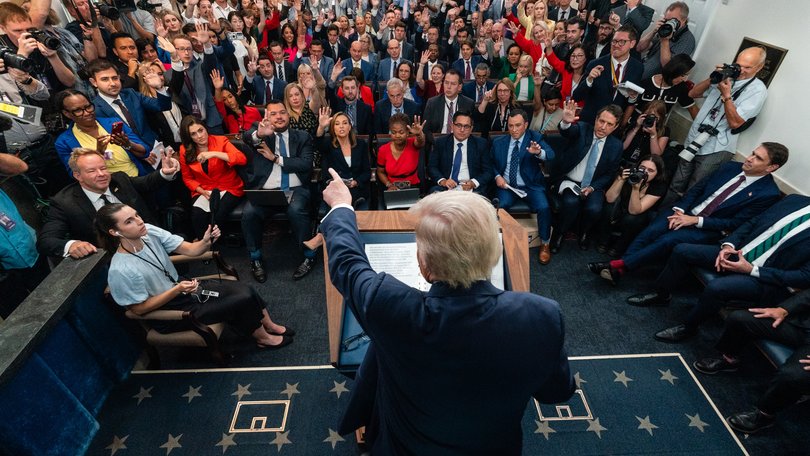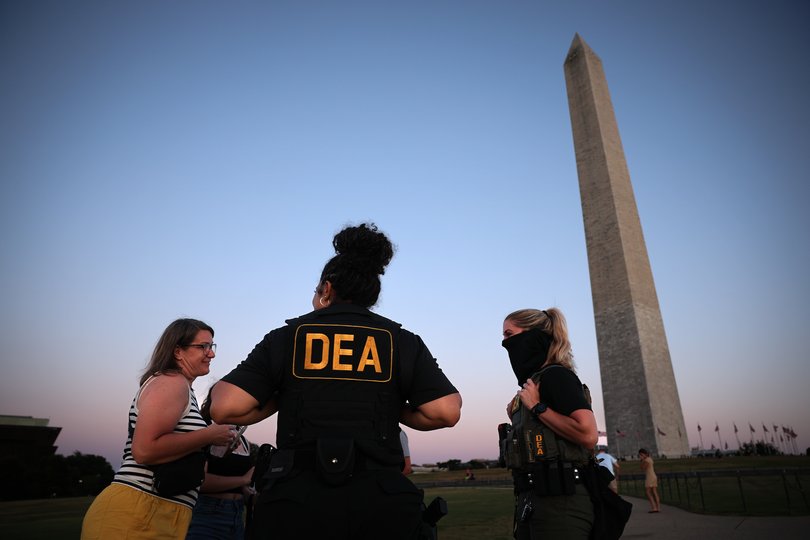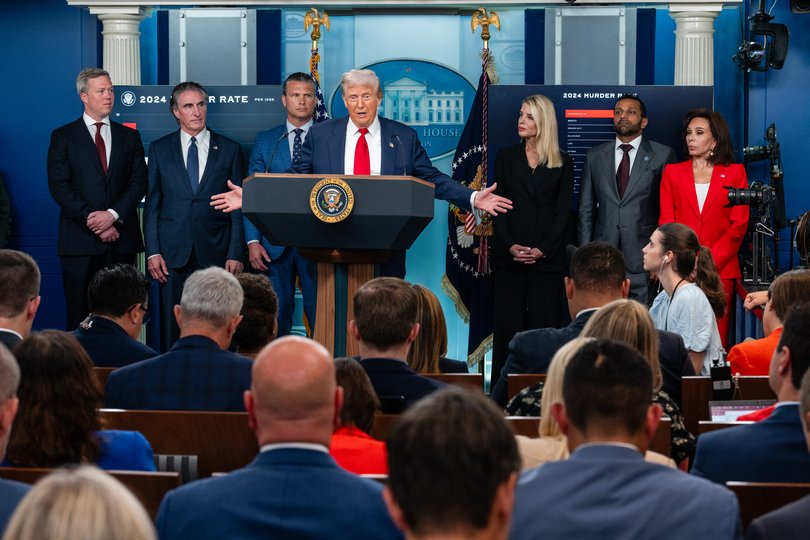Washington crime crackdown: Donald Trump orders federal takeover of DC police, deploys National Guard

President Donald Trump announced Monday that he was placing the DC police under direct federal control and will deploy the National Guard to the streets of Washington to fight crime, an extraordinary flex of federal power that stripped city leadership of its ability to make law enforcement decisions and could expose residents of the nation’s capital to unpredictable encounters with a domestically deployed military force.
The decision to take over the DC police and deploy 800 National Guard troops comes as the President has been slamming America’s cities as places where crime is out of control, despite two years of declines that have brought homicide levels in many major cities to their lowest levels in decades.
The Administration has already mobilised FBI agents in recent days in overnight shifts to help local law enforcement prevent carjackings and violent crime, officials said.
Sign up to The Nightly's newsletters.
Get the first look at the digital newspaper, curated daily stories and breaking headlines delivered to your inbox.
By continuing you agree to our Terms and Privacy Policy.Because the District of Columbia is not a state, the Federal Government has unusually sweeping powers to intervene over the objections of its residents and leaders, giving the President an opportunity to use it as a laboratory for a militarised approach to urban crime-fighting.
Under the city’s Home Rule Act, the President can take over the DC police for a period of up to 30 days by declaring “special conditions of an emergency nature exist.” After that time, the police would revert to local control unless Congress passes a law to allow a longer period of federal control.
Whether the Administration would want to extend the takeover beyond 30 days is unclear. In previous actions, including sending the National Guard to Los Angeles, Mr Trump made high-profile declarations, then allowed the federal deployments to fade out over time. A longer period of federal accountability for local DC crime could raise the political risk for Mr Trump.

At an afternoon news conference, Mayor Muriel E. Bowser, a Democrat, said she intended to comply with the order, making clear that she believed she had little power under the Home Rule Act to do otherwise, though she said a legal review was underway. She also sought to downplay the order’s impact on day-to-day policing.
“We’re at a 30-year violent-crime low. We’re not satisfied. We haven’t taken our foot off the gas, and we continue to look for ways to make our city safer,” she said.
“While this action today is unsettling and unprecedented, I can’t say that - given some of the rhetoric of the past - that we’re totally surprised.”
Ms Bowser added that she was seeking a meeting with Attorney General Pam Bondi to discuss the takeover.
“The fact that we have more law enforcement and presence in neighbourhoods that could not, you know, that may be positive,” she said.
Mr Trump has portrayed crime in the nation’s capital as spiralling upward. Ms Bowser has noted repeatedly that violent crime has declined for the past two years after a sharp post-pandemic spike in 2023.
Terry Cole, the head of the Drug Enforcement Administration whom Mr Trump named as the commissioner of the DC police, met Monday evening with DC Police Chief Pamela A. Smith and relayed to her that “the federal team involved in this know that they don’t know the city, and they are looking for (the DC police department) to lead” the effort, a DC police official said, speaking on the condition of anonymity because they were not authorized to discuss the matter publicly.
The Justice Department did not immediately respond to a request for comment about the official’s account.
Chief Smith tasked her widely respected No. 2, Executive Assistant Chief Jeffrey Carroll, with leading the relationship between DC police and their federal partners, the official said.
Mr Trump, however, portrayed a sweeping vision of law enforcement on the streets of Washington, declaring that federal agents, DC police and the National Guard would use physical force to intimidate lawbreakers inside the District.

“They fight back until you knock the hell out of them, because it’s the only language they understand,” Mr Trump told reporters at a White House news conference. “It’s a disgusting thing.”
“It’s becoming a situation of complete and total lawlessness, and we’re getting rid of the slums, too,” Mr Trump added. “I know it’s not politically correct. You’ll say, ‘Oh, so terrible.’ No, we’re getting rid of the slums where they live.”
Mr Trump’s rhetoric brought an angry response from the members of the DC Council.
“This is a manufactured intrusion on local authority. Violent crime in the District is at the lowest rates we’ve seen in 30 years. Federalising the Metropolitan Police Department is unwarranted because there is no Federal emergency,” the council members said in a joint statement. “It is our police officers who should be leading the efforts to keep our communities safe - not the National Guard.”
“The Administration’s actions are unprecedented, unnecessary, and unlawful. There is no crime emergency in the District of Columbia,” DC Attorney General Brian Schwalb, a Democrat, said in a statement. “We are considering all of our options and will do what’s necessary to protect the rights and safety of District residents.”
Ms Bowser suggested a legal challenge to Mr Trump’s emergency declaration would be unlikely to succeed. “We could contest that, but the authority is pretty broad,” she said at her news conference.
The National Guard deployment is separate from the takeover of the police force and could last longer. Those troops will be able to take direct action, including conducting arrests, according to national security legal experts. The ability of the National Guard to take such law enforcement action results from the District’s lack of statehood.
Because of that, Mr Trump can mobilise the DC National Guard in the same fashion that a governor could do in a state. In the rest of the country, the armed forces are typically not allowed to take direct part in civilian law enforcement.
An Army official said that there were no plans for troops to engage in law enforcement at this point, but that they could conduct arrests if needed.
Army spokesman Colonel Dave Butler said that National Guard troops should be in position later this week. Since most live locally, the troops will serve in shifts of 200 each, to provide round-the-clock presence, Col. Butler said.
The troops for now will be focused on providing logistical and administrative support to free police officers to conduct law enforcement. In some cases the troops will provide presence at intersections that can be a deterrent to crime.
Administration officials have not specified where the National Guard troops would be deployed. Ms Bondi repeatedly spoke at the news conference about crime as it affects tourists, suggesting one focus of the administration’s crackdown.
Mr Trump has repeatedly complained about crime in Washington and the city’s homeless population, but he was spurred to further action in recent days by an assault on a former US DOGE Service staffer, who was injured in an alleged carjacking, a person familiar with internal White House deliberations said Monday, speaking like others on condition of anonymity to speak about internal considerations.
Soon after the attack, DC police arrested a boy and a girl, both 15, from Maryland and charged them with unarmed carjacking of Edward Coristine, who is also known by the nickname “Big Balls.”
Mr Trump last week posted an image of Mr Coristine smeared in blood, sitting shirtless on the ground, warning that “if DC doesn’t get its act together, and quickly, we will have no choice but to take Federal control of the City.”
At the news conference where he announced his plans, Mr Trump was flanked by top officials including Ms Bondi, US Attorney Jeanine Pirro, FBI Director Kash Patel, Defence Secretary Pete Hegseth and Interior Secretary Doug Burgum.
Wrongdoers will “not be allowed to turn our capital into a wasteland for the world to see,” he said, adding that world leaders who visit Washington should not see graffiti or signs of urban decay.
“If our capital is dirty, our whole country is dirty, and they don’t respect us,” he said.
Mr Trump said that Chicago and New York City - two other major Democratic-controlled cities - could be next. Mr Trump can’t take over their police forces, but he could theoretically deploy the National Guard, as he did in California earlier this year.
Mr Trump’s move could hold significant risks for DC residents, with federal officials and troops who have little or no training in urban law enforcement empowered - and even encouraged - to use physical force to maintain order.
In addition to the temporary takeover of the police and the deployment of the National Guard, administration officials said that they would seek to expand the ages at which juveniles can be charged as adults.
Under DC law, the city’s attorney general prosecutes most juvenile crime. The US attorney for DC - the federal prosecutor - handles adult criminal cases in the District and can charge 16- and 17-year-olds as adults if they are accused of certain violent crimes, including murder, rape, armed robbery and burglary.
City leaders have disputed Mr Trump’s characterisation of crime in Washington, saying that the nation’s capital is safer than it was a year ago. Violent crime is down 26 percent compared with this time in 2024, according to DC police data. Homicides are down 12 percent.
The 2023 homicide spike turned Washington into one of America’s deadliest cities. But the crisis has significantly eased in Washington and across the nation, and in 2024, homicide rates were at their lowest in decades, according to data that The Washington Post collected from more than 100 police departments in large US cities. Reports of burglaries and robberies have also dipped by double-digit percentages.
The National Guard deployment will be another example of the president’s increasing use of US military forces to carry out his objectives on American soil, an approach that has been used only sparingly over history.
Earlier this year, the President tested legal limits when he bypassed California’s Democrat Governor Gavin Newsom and unilaterally deployed thousands of National Guard troops to protests over Immigration and Customs Enforcement raids in Los Angeles, an unprecedented move that is being challenged in court. Mr Newsom had repeatedly asserted that the National Guard’s presence was not needed.
The FBI had already begun dispatching some 120 agents to overnight shifts in recent days, several people familiar with the matter told The Washington Post, speaking on the condition of anonymity to discuss staffing plans that had not been made public. The FBI officers were tasked with assisting local law enforcement in preventing carjackings and other crimes.
Congressional reaction to the plan predictably fell along partisan lines.
“President Trump is RIGHT. We can’t allow crime to destroy our Nation’s Capital,” House Speaker Mike Johnson, the Republican representative for Louisiana, wrote on X.
Nancy Pelosi, the Democrat Representative for California and a former House speaker, said on X that Mr Trump was “activating the DC Guard to distract from his incompetent mishandling of tariffs, health care, education and immigration - just to name a few blunders.”
© 2025 , The Washington Post
